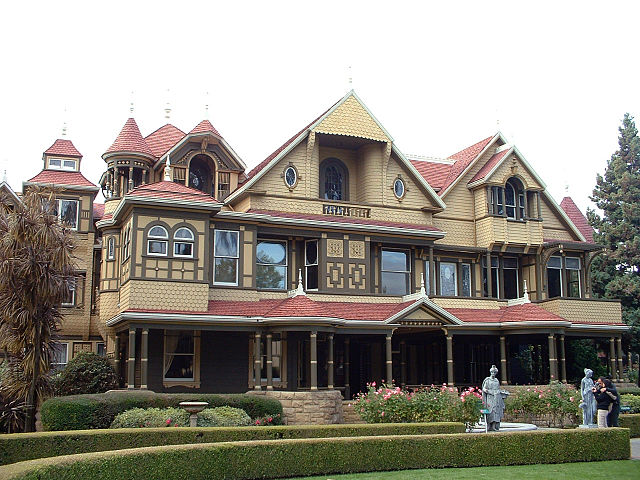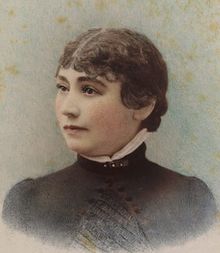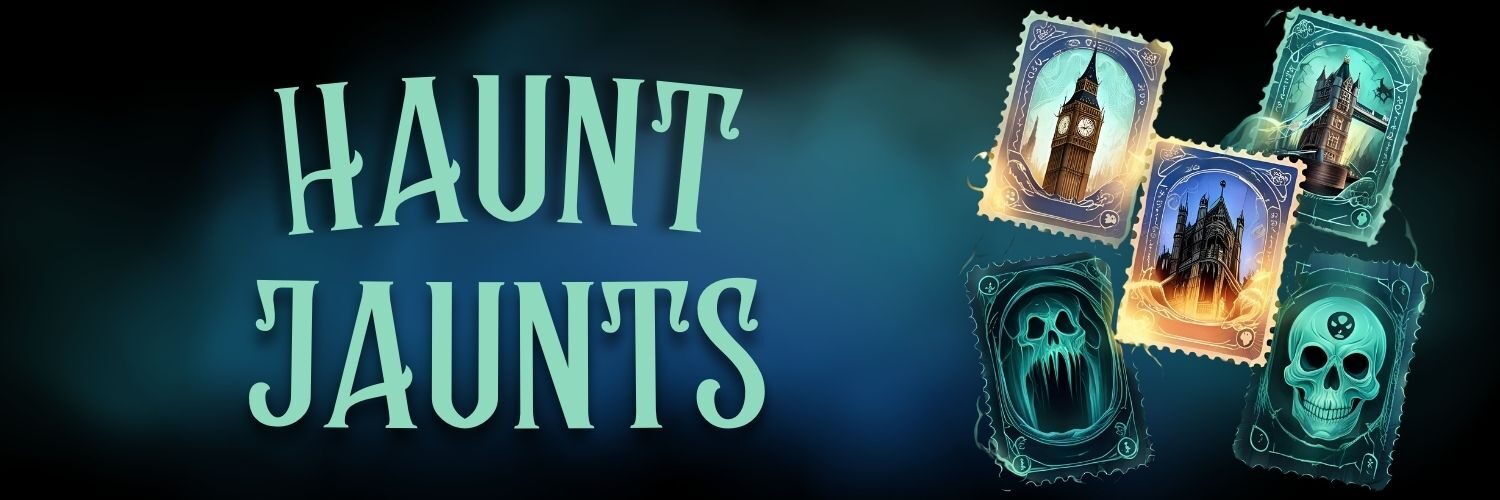
This is a guest contribution from Desmond Rhodes.
The tale of Sarah Lockwood Pardee, or later and more famously known as Sarah Lockwood Winchester, is one born of tragedy and shrouded in mystery. She was an heiress to an enormous fortune brought onto her by the death of her husband. The inheritance turned out to be, what some believe, a lifelong curse. Her tale has even been referenced in movies, most recently portrayed by Helen Mirren.
Sarah left behind what is known as the Winchester Mystery House; a beautiful, yet eerie masterpiece that was under daily construction for 38 years. A couple of theories surrounding the odd architecture of house come to the hypotheses that either Sarah was an innovative genius or the house was built to house the spirits.
Below, we take a look Sarah’s life and legacy to determine to, hopefully, determine which hypothesis is correct.
A Tragic Life

Sarah was born into a middle-class family in New Haven, Connecticut around the 1840’s. She was known for being musically talented and intelligent with the beauty to match. She caught the eye of William Wirt Winchester, and in 1862 they married. William was the one and only son of the owner of the Winchester Repeating Arms Company, Oliver Winchester. Winchester rifles were extremely popular in the American Civil War, and later on, referred to as “The Gun That Won the West.”
Sarah and William had one daughter, who unfortunately died just six weeks after birth in 1866. They had no more children, as they had a hard time coping with terminal illness and loss of their loved one. Regrettably, this was only the start of a grief-stricken life for Sarah. In 1881, William died of tuberculosis, and with his father passing just a year before, Sarah inherited a large sum. She received $20 million, and roughly 50 percent ownership of Winchester Repeating Arms, which included a daily royalties income of $1000.
A Ghostly Warning
Although Sarah Winchester was one of the wealthiest women in the world at the time, she was overwhelmed with sorrow. In today’s world, we have advice on how to handle receiving an inheritance, but Sarah’s method was to visit a medium in suspicion that her family was cursed. The clairvoyant, to her dismay, confirmed her suspicion and told her that her family was indeed cursed by all the spirits killed by Winchester rifles.
To ward off the spirits (and therefore her death) she was told to build a house for the ghosts. She was cautioned to continue building this house, for if the construction stopped, she would die. So in 1886, Sarah Winchester moved out west with her inheritance to begin construction in, what is now, San Jose, California. Some say it was to be closer to her family, and some say it was from the orders of the souls taken from Winchester rifles.
The Winchester House
Sarah Winchester purchased an eight room farmhouse in California and turned it into an approximately 161 room, Queen Anne Style Victorian mansion. The architectural design is as beautiful as it is bizarre. As it stands today (the 161st room was just found in 2016,) there are:
- About 2,000 doors: Some of which open up into blank walls, leading to about a 15-foot fall to the outside, and one drops right over the kitchen sink.
- Approximately 10,000 windows: Some stained glass, including what some call one of the finest stained glass collections in the world. However, one stain glass window is part of a room that receives no light, so you can’t see it’s full beauty. The windows also involve skylights, one of which is placed into the floor.
- 40 stairways: Some of which lead to nowhere, including going right up into the ceiling. Also, unusual steps that were only a couple inches high.
https://youtu.be/3S5505SeNLA
The place was a seven-story maze of hallways, two basements, and two ballrooms — one costing $9,000 to build and the other one unfinished. Mrs. Winchester had the money to do what many people, then and now, aren’t able to do. Some say the confusing layout was to puzzle the supernatural visitors and keep them preoccupied. Others think it that it was misguided inventiveness — which sounds plausible until you hear that there was no blueprint, or master plan to the house, but the plans for construction were determined in her seance room that she visited every night.
The Seance Room
Sarah Winchester had over 20 construction workers, and even more servants and gardeners, and no one stepped foot in her seance room. Every night she would go into the seance room, come out and go to sleep in a different room to confuse the spirits, and in the morning she would speak to the handymen about the day’s project — told to her in the seance room. There is one door that enters the seance room, but three exits, including the one right onto the kitchen sink.
If that’s not enough, Sarah had an affliction for the number thirteen. There are thirteen panels to make up the ceilings and floors, thirteen panes of glass in most instances, and stairways with thirteen steps. Sarah’s will was written into thirteen sections and signed thirteen times. If no one went to the seance room except for Sarah, why were there thirteen hooks for robes built in there?
Explanations
The bizarre way in which the Winchester House was build has been attempted to be explained away by her inventiveness. In fact, the Winchester House did have some innovative elements for its time. Three elevators, electricity, a gas-manufacturing plant, and an elaborate plumbing/gardening water recycle systems. She even had her own call system in the house so servants could find her in the seven-story house.
Many things in the house considered to be bizarre and decided by the supernatural are explained away as the misguided ingenuity of Sarah, and a way to cope with the loss of her loved ones. Bradley University suggests productive activities when coping with grief such as terminal illnesses — so maybe Mrs. Winchester’s obsession with building this new house was indeed just her coping mechanism for dealing with the loss of her first born child and husband?
Still A Mystery Today
Sarah Winchester died in 1922, leaving behind the house to her niece. The, seven-story house had been reduced to four when the 1906 California Earthquake damaged the top three floors. Mrs. Winchester took it as a sign that the spirits were not happy with the nearing completion, as the earthquake trapped her in a bedroom for hours until servants and groundskeepers were finally able to get her out. She then promptly boarded up the front portion of the house. It stayed that way until after her death in 1922; construction stopped immediately on the house.
Her niece took what she wanted and then auctioned off the rest. But, exciting news for you Jaunters out there — the Winchester Mystery House is a tourist attraction and gives guided tours! Paranormal activity has been heard and felt — nightmares after visiting, footsteps heard on the third floor where the servants resided, and an otherwise general feeling of creepiness.
Was Sarah Winchester instructed by ghosts to build this labyrinth of a house, or was it simply her progressive and brilliant mind — that’s up for you to decide!
About The Contributor
Desmond Rhodes is a writer out of the Northwest and an entertainer of conspiracy theories who predicted the ending to The Sixth Sense.
Got an idea you’d like to submit? We’re always looking for quality infotaining posts about true crime, horror, and the paranormal –or some blend thereof. Visit our Writers Wanted page for submission details. We’d love to have you join our Skeleton Crew!
P.S.
Yes.
That’s the answer to that question we know you’re wondering about. We do pay. Not a lot. Don’t get excited. But we believe in paying writers for their time and energy. You’ll find complete details on the Writers Wanted page.
